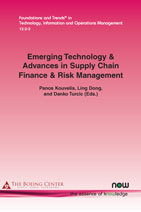Financial Incentives to Avoid Major Quality Problems in a Supply Chain
By Susan A. Slotnick, Cleveland State University, USA, s.slotnick@csuohio.edu | Matthew J. Sobel, Case Western Reserve University, USA, matthew.sobel@case.edu
Abstract
Manufacturers who outsource components incur risks as well as benefits. If the supplied product has a major quality defect, the adverse effect on the manufacturer’s reputation reduces its market share. This paper presents a discrete-time model of a buyer who collaborates with a sole supplier to avoid quality problems by paying a higher per-unit purchase price to the supplier and/or paying the supplier a lump sum contingent on the absence of a major quality defect. Analytical results include an optimal risk-posture policy for which the buyer should use only one of these financial incentives or the other, and computational results provide insights about the relationship of that optimal policy to various parameters.
Emerging Technology & Advances in Supply Chain Finance & Risk Management
Emerging Technology & Advances in Supply Chain Finance & Risk Management reflects the state-of-the-art in research thought leadership in supply chain finance and risk management, and it contains great expository pieces on how advanced technologies are shaping supply chains and risk management within them. You will also find ideas on how supply chain finance and risk management can be best taught in our classrooms.
The volume is divided into three parts, each part reflecting a major active research area of the field including: Part 1: Supply Chain Finance; Part 2: Financial Hedging and Commodity Risks; Part 3: Operational Strategies and Risk Management.
Part 1 deals with the broad area of supply chain finance and programs that will better allow for working capital management within supply chains. Part 2 introduces concepts of hedging financial and operational risks due to uncertain commodity prices, fluctuating exchange rates, and volatile interest rates. Emphasis is placed on understanding how financial hedges can be used for hedging relevant supply chain risks in a way that reflects modern view of financial risk management. Part 3 examines topics and solution approaches reflecting the more traditional treatments in the contemporary literature of operational and supply chain risks. This volume provides rich implications for future research directions in efforts to master the new complexities and uncertainties of the global business environment and better understand the impact of advanced technologies in global supply chains.

Companion
Foundations and Trends® in Technology, Information and Operations Management, Volume 12, Issue 2-3 Special Issue: Emerging Technology & Advances in Supply Chain Finance & Risk Management
See the other articles that are also part of this special issue.